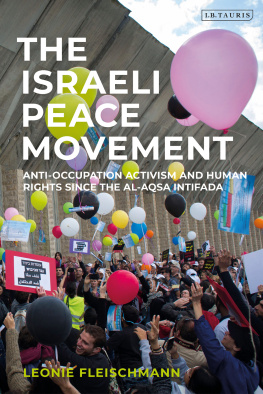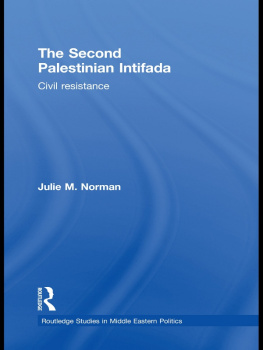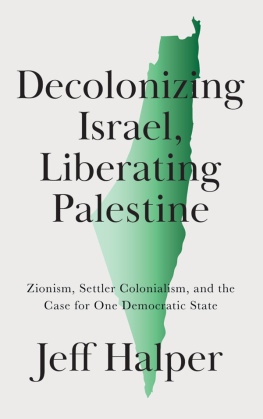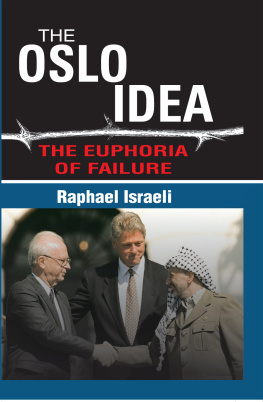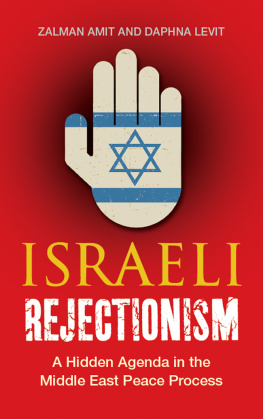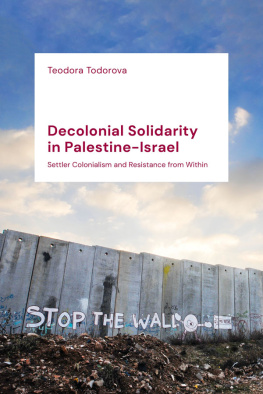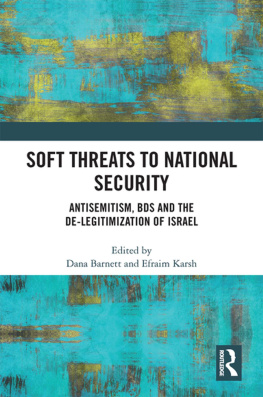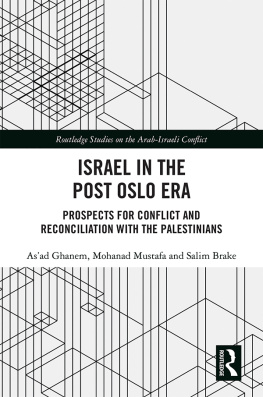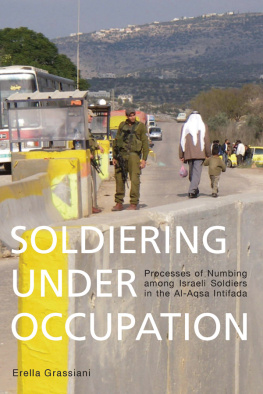The Israeli Peace Movement
The Israeli Peace Movement
Anti-Occupation Activism and Human Rights since the Al-Aqsa Intifada
Leonie Fleischmann

Contents
The idea of this booked emerged after I spent a year in Jerusalem, working for the IsraelPalestine Centre for Research and Information. Through this organization and through friends I made in the city, I discovered an array of Israelis who were dedicating their time and efforts to challenging the prevailing realities. In particular, I was witness to the emergence of a large wave of demonstrations in the Palestinian neighbourhood of Sheikh Jarrah in East Jerusalem. Along with my Israeli friends, we walked down from central West Jerusalem to the neighbourhood, to be welcomed by the Palestinian residents and the original Israeli activists. I learnt about the evictions of the Palestinians who were replaced by Jewish settlers and I learnt about Israelis who wanted to support the Palestinians. It was from there that my interest in these individuals and the groups they were operating in was sparked. Others in Israel and back home in London would remark that my research was a waste of time; there is no peace movement in Israel. They are right. However, there was and is a vibrant community of human rights and radical activists striving to create change in the region. It is this community, the groups and the individuals that it is composed of, that this book documents. It is to these individuals that I give special thanks for sharing their ideas, their experience and their challenges with me. I am in awe of your commitment to making the world a better place.
This book would not have been possible without the support of City, University of London, which offered a vibrant and nurturing space to cultivate this research. I am especially grateful to Amnon Aran and Thomas Davies for guiding me through this project. Their feedback and insights were invaluable to the progress and completion of this book. I am particularly indebted to Amnon Aran for offering his support and guidance in helping my career develop. I am also grateful to Rosemary Hollis, Sara Silvestri and Clive Jones for their vital comments on the development of this project. I would sincerely like to thank the two anonymous reviewers for their detailed and insightful comments. Special thanks go to my editor at I. B. Tauris, Sophie Rudland, for giving me the opportunity to produce this book and being continually supportive in the process.
My family, friends and partner, who have given me their unconditional support through the ups and downs of the past years, I thank you dearly.
List of main groups in each component operating since 2000 |
Collective action frames |
Tactics employed |
Dimensions of movement-mobilizing structures |
Its important for me to explain that Israel isnt all tanks and soldiers running after small children. Israel isnt just the army. There are law-abiding citizens who are concerned about human rights in Israel. Thats very important for me to clarify.
I think its our responsibility as Israeli Jews to tackle the propaganda tactics globally. If they are saying that anything that is pro-Palestinian is anti-Semitic, I think its on us to be there to say that doesnt make sense.
We were born to the position of the colonizer [] . So, whats our role? We have power, I didnt choose to have it, so at least I can use it in a way that can actually break this situation.
These are the voices of IsraeliJewish dissenters, who are actively challenging Israeli government policy, the Israeli State narrative and actions towards the Palestinians. The problems they focus on and the solutions they propose vary depending on ideological and political positioning. Some commit their time and energy in pursuit of an end to the conflict and peace between Israel and the Palestinians; others reveal the violations of Palestinian human rights at the hands of the Israeli authorities, in order to encourage an end of the Israeli military occupation of the West Bank and the blockade of the Gaza Strip; still others acknowledge their history as a colonizing population, dedicating their efforts to supporting the struggle of the Palestinian people. This book tells the story of this broad spectrum of Israeli dissenters their ideological and political beliefs, their actions on the ground, their relationships with the Palestinians, and their attempts to bring peace, equality and justice to the region (Table 1.1).
main groups in each component operating since 2000
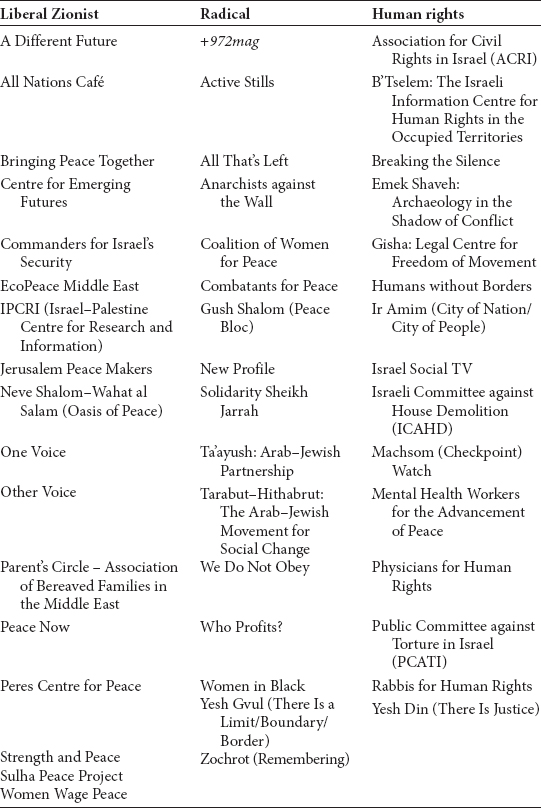
Without disregarding or silencing the voices and efforts of the Palestinians, it is worth looking at others who are also challenging the Israeli narrative and practices. In particular, it is worth looking at those whom the Israeli authorities are dependent on: Israeli citizens, specifically IsraeliJewish citizens. Given that Israeli Jews both implicitly and explicitly uphold the Israeli government and its policies, dissention among them is a key piece in creating change.
The IsraeliJewish dissenters are not a homogenous group, with a variety of organizations and individuals operating in Israel and Palestine. They can be divided into three components to help understand their trajectories. In direct opposition, the liberal Zionist component has understood the dangers of occupying another population and has proposed giving up the West Bank for the sake of peace. This component became the largest voice of Israeli peace activists in the 1980s and 1990s by proposing a Palestinian State side by side with the Israeli State and continues to pursue a political peace process with the Palestinians. It includes a number of public intellectuals, authors and former members of the Israeli parliament, which highlights this components connection to powerful elites. Historically the liberal Zionist component has been criticized for being elitist, alienating those who are not middle-class, secular or educated Jews of Eastern European origin. It tends not to be too confrontational, aiming to speak to and mobilize the Israeli public and directly influence the government.
Members of the second component consider themselves radical activists, who consistently put the Palestinians at the centre of their concern, focusing on equality and justice, rather than peace. Their discourse has evolved from and is in line with the Palestinian narrative and discourse, with many of the activists acknowledging their position and history as colonizers. At differing levels, they align themselves with the position that Israel conducted an ethnic They see themselves as co-resisters or solidarity activists, promoting and supporting the resistance efforts of the Palestinian activists. Thus, the Israeli activists and the Palestinian activists are acting alongside each other, influencing the ways in which they both perceive and respond to the prevailing realities. There has not been a consistent political agenda among the radical groups, which include anarchists; anti-Zionists, who are against the establishment of a Jewish homeland in historic Palestine; those calling for a binational state, some calling for a two-state solution; and those who do not propose a political solution. Their tactics are the most confrontational and come with the risk of injury or arrest. While the insistence on equality or access to human rights is not radical per se, given they are merely reflecting international norms and agreements, the activists are radical in the sense that they are on the extreme margins of Israeli society, supporting and promoting positions that are considered unacceptable, taboo and even illegal within Israel.

